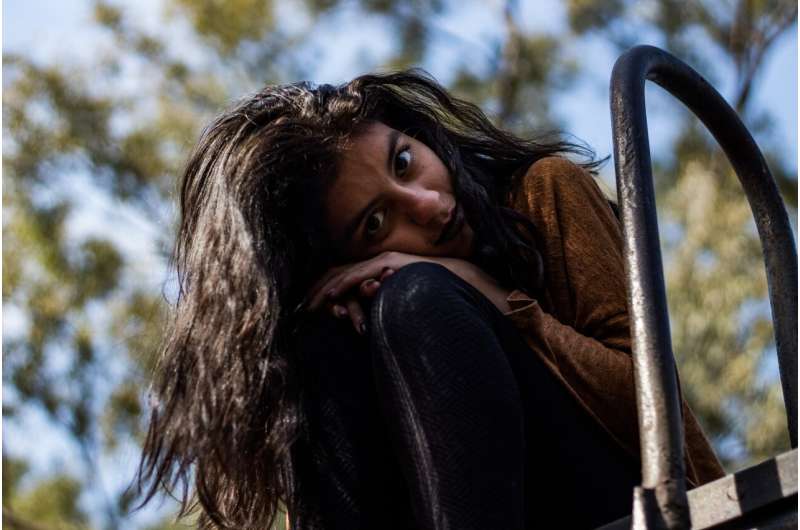
The University of Chicago Education Lab released a new study June 7 that found school-based group counseling programs can significantly reduce PTSD, anxiety, and depression among Black and Latina girls. The study, which evaluated the Working on Womanhood (“WOW”) program, a program developed by and for Black and Latina women and girls through the non-profit organization Youth Guidance, comes as girls nationwide experience significant trauma compounded by the pandemic.
WOW was found to significantly reduce PTSD symptoms by 22% among adolescent girls in Chicago neighborhood schools, in addition to reductions in anxiety and depression. These are critical findings as young girls in the United States report record levels of sadness, suicidal thoughts, and violence.
The study, published in Science Advances, measured the impact of providing Working on Womanhood’s weekly, in-school, group-based mentoring services and skill-building rooted in narrative therapy, acceptance commitment therapy, and cognitive-behavioral therapy. The study included more than 2,000 Chicago Public School girls in 9th–11th grade across ten neighborhood high schools, 85% of whom were Black or Latina.
Girls did not show outward signs of risk factors—most were coming to school regularly and maintained at least a B average. However, the study team conducted a baseline survey that found staggeringly high rates of trauma exposure—nearly a third of the participating young women had witnessed someone being violently assaulted or killed, and almost half had someone close to them die violently or suddenly. Prior research has shown violence exposure has a direct impact on student learning—according to one study, Chicago students spend roughly one week out of every month functioning at a lower cognitive level solely because of their proximity to homicides.
In this study, the Education Lab found that an astonishing 38% of 9th- to 11th-grade adolescent girls in Chicago’s neighborhood schools exhibited signs of PTSD at baseline—double the rate experienced by service members returning from Iraq and Afghanistan.
“We are thrilled that the WOW program is generating significant results for Chicago students,” said Pedro Martinez, Chief Executive Officer of Chicago Public Schools. “CPS is dedicated to supporting our students in and outside of school—and WOW provides exactly the sort of evidence-based, trauma-informed programming they need to thrive.”
“Despite astonishing and increasing levels of trauma among school children, there is a lack of evidence about what school and city leaders can do in response,” said Dr. Monica Bhatt, Senior Research Director of the University of Chicago Education Lab, one of the lead researchers on the study. “We hope these findings inform how public and private dollars can address the specific challenges facing young women today—particularly in the wake of a global pandemic which has exacerbated trauma exposure among young people.”
The paper, “Randomized Evaluation of a School-Based, Trauma-Informed Group Intervention for Young Women in Chicago,” is the first large-scale randomized controlled trial of a school-based trauma mitigation program for young women; it is especially notable given that most research does not focus on evaluating programs specifically designed by Black and Latina women for young Black and Latina girls.
Trauma-related mental health research has traditionally focused on treatments for young men, especially with regard to gun violence prevention, even as the consequences of trauma are disproportionately borne by girls. Young women are more likely than young men to report PTSD symptoms after a traumatic event, suffer from depression, and develop an anxiety disorder. As such, the University of Chicago Education Lab’s study fills a critical gap in America’s understanding of childhood trauma.
“While Chicago students demonstrate extraordinary resilience, we know trauma and violence have a significant impact on student success,” said Dr. Janice Jackson, former CEO of Chicago Public Schools and current CEO of nonprofit HOPE Chicago. “That’s why the WOW program is so valuable—it’s a real solution that disrupts the cycle of trauma and improves students’ well-being in and out of the classroom.”
The study provides an evidence-based foundation for how school officials can affordably reduce mental health challenges and increase the likelihood of graduation among high-school girls. At a cost of roughly $2,300 per participant, WOW far surpasses the standard cost-effectiveness thresholds used for evaluating medical and public health interventions. This indicates the WOW program is not only effective, but scalable to other cities and school districts. Youth Guidance has already expanded the program from Chicago Public Schools to a number of other cities, including Dallas, St. Louis, and Boston.
“WOW was developed by and for Black and Latina women to disrupt the cycle of intergenerational trauma,” said Nacole Milbrook, Chief Program Officer at Youth Guidance. “We’ve seen dramatic improvements in the mental health and well-being of the young women we serve, and we’re proud that this rigorous study reinforces these results. We look forward to bringing the WOW program to schools and students across the country.”
In 2009, the University of Chicago’s Crime Lab conducted a similar evaluation of Youth Guidance’s Becoming a Man (“BAM”) program, a school-based counseling program for high-school boys. They found BAM increased participants’ on-time high school graduation rates by 19% and cut violent crime arrests in half during the program year. On the strength of these findings, the program expanded nationwide and is now enrolling nearly 10,000 students across eight cities. In 2014, President Barack Obama joined a BAM meeting which informed the launch of his My Brother’s Keeper initiative, which served to support similar programs nationwide.
More information:
Monica Bhatt, Randomized Evaluation of a School-Based, Trauma-Informed Group Intervention for Young Women in Chicago, Science Advances (2023). DOI: 10.1126/sciadv.abq2077. www.science.org/doi/10.1126/sciadv.abq2077
Journal information:
Science Advances
Source: Read Full Article


